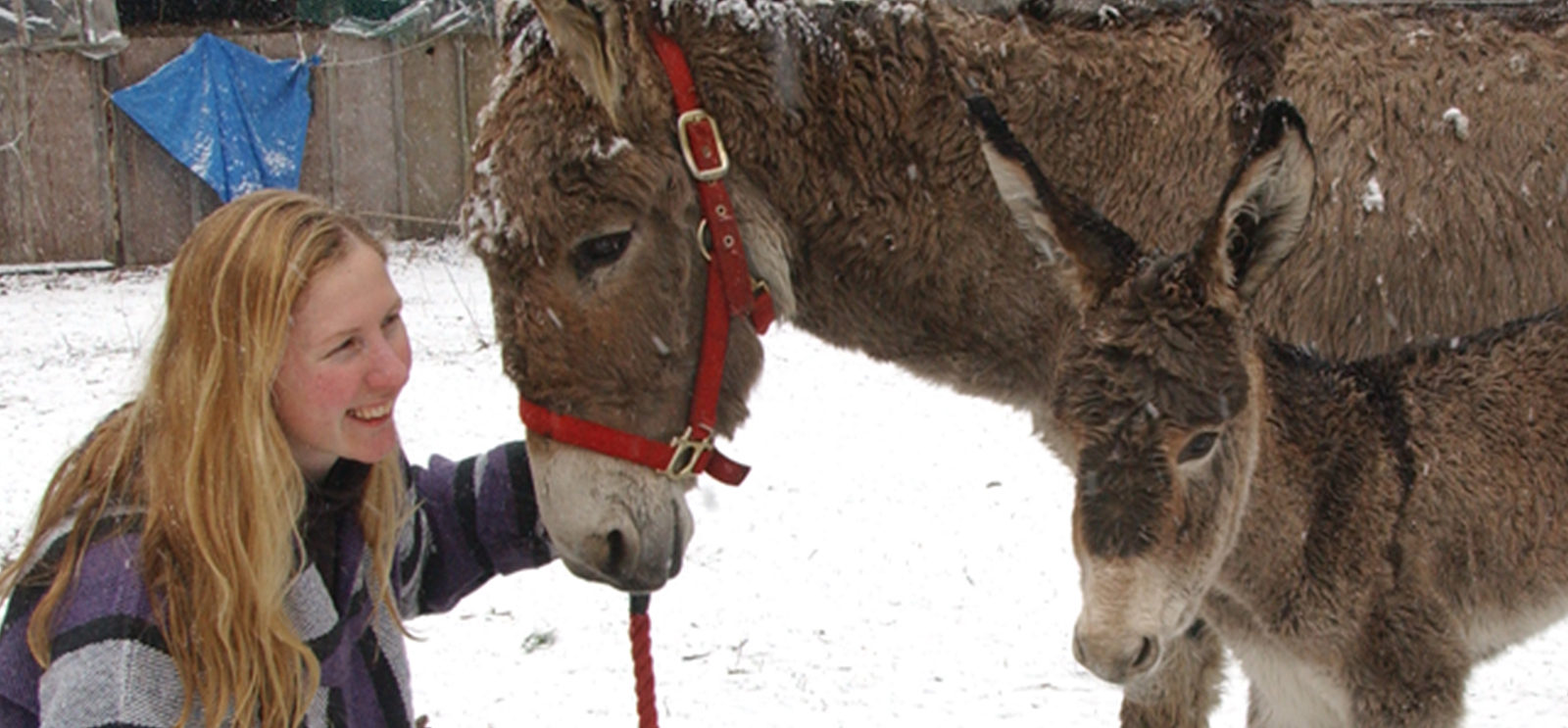
Campbell visits her mother’s farm daily to commune with the donkeys. Jenny, who died this past year, stands with her foal Don Quixote. (Photo courtesy of Bonnie Jo Campbell)
A homebody with a hitchhiker’s heart, Bonnie Jo Campbell writes stories that cover a lot of ground.
Bonnie Jo Campbell, AB’84, is a good country person. Growing up on a farm in Kalamazoo, Michigan, in the 1970s, she hauled buckets and buckets of water before her family had good plumbing. She calls it the “drudgery of my youth.” Flexing her bare biceps, she says, “That’s why I have muscles like these even today. Even at 48 or 49, or whatever the hell I am.”
Campbell, who is 49 and the winner of a 2011 Guggenheim Fellowship, sets many of her books in rural Michigan—her latest novel, Once Upon a River (W. W. Norton, 2011), takes place in her hometown, Kalamazoo. She lives in a house in the woods with her husband, Chris Magson, a factory worker at Pfizer. She visits her mother’s farm daily to see the donkeys, chickens, and roosters there. Her favorite rooster, Cardigan, has spurs on the back of his legs that are “so long he almost can’t walk.”
The national attention Campbell’s writing has garnered at times disrupts her homebody lifestyle. The Guggenheim came after her 2009 collection of short stories, American Salvage (Wayne State University Press), was named a National Book Award finalist. So occasionally, she says, she has to act professional and dress nicely. She has to watch her manners and attend civilized events like book festivals and signings. “I’m not supposed to say outlandish things,” she says. “I’m supposed to be pleasant and say please and thank you.”
In late July, on the same day the New York Times praised her newest novel as “an excellent American parable about the consequences of our favorite ideal, freedom,” Campbell was wearing jeans and a sleeveless plaid shirt at her hometown haunt, the Old Dog Tavern. Walking the hundred feet from the door to the bar, where she ordered a Bloody Mary, she greeted half a dozen friends. Then she started talking about Once Upon a River. The novel centers on Margo Crane, a runaway teenager complicit in her father’s murder who takes off in a boat to look for the mother who abandoned her. A skilled sharpshooter and a striking beauty, Margo bounces from man to man along the way, never losing her independence.
Campbell started making her own adventures in her late teens. The summer after her second year at Chicago, where she studied philosophy, she and her boyfriend hitchhiked across the country. As they passed through Phoenix, a circus caught her eye, so she walked in and asked for a job. Her boyfriend continued to Los Angeles, and she spent the rest of the summer on the circus train, serving snow cones at each stop, an experience that provided material for several short stories, including her Pushcart Prize–winner “The Smallest Man in the World.”
Campbell’s writing has been compared with that of John Steinbeck and Mark Twain. Once Upon a River seems to evoke Flannery O’Connor. But for O’Connor, Campbell counters, “eternal heaven with God is the most important place.” Campbell’s “not so confident about what’s going to happen after this. So I have to believe in what’s here and now. If you’re really devoted to the life hereafter, I don’t think you can truly be devoted to life here.”
Less than a week after her visit to the Old Dog Tavern, Campbell flew to Denver, continuing a national book tour. Next time, she says, “I should do a donkey tour. I would walk at that pace and just have a donkey with me carrying my stuff. Wouldn’t that be fun?”
